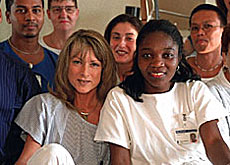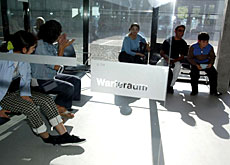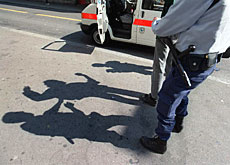Swiss told to step up anti-racism efforts

Switzerland has been criticised by a European body for failing to make sufficient progress in combating racism and intolerance.
The report released by the Council of Europe on Tuesday also noted the hardening of political attitudes towards foreigners and police abuses.
Responding to the findings, the Swiss authorities admitted that some of the criticisms were justified.
The European Commission against Racism and Intolerance (ECRI), which wrote the report, said Switzerland had made progress in combating discrimination in some areas but there remained much work to be done.
“Progress remains fairly limited in a number of areas,” said the executive secretary of the ECRI, Isil Gachet.
“We are preoccupied with some cases of discriminatory treatment by the police towards members of certain minority groups and in particular black Africans,” she told swissinfo.
On a positive note, the ECRI welcomed Switzerland’s new constitution, which came into force in 2000 and which prohibits discrimination.
It also praised the establishment of a Federal Anti-Racism Service, as well as plans to extend criminal law provisions to combat racism.
However, there were more brickbats than bouquets for the Swiss.
The commission said that the Swiss authorities had to do more to ensure that cantonal and federal authorities, as well as the general public, were aware of the constitution’s anti-discrimination clause.
Police abuses
The police were also criticised, in particular for their conduct towards black Africans.
The European body reported that members of this minority group were subjected to frequent identity checks and were often taken into custody for no reason.
It also criticised the practice of closing off certain areas of towns and cities to members of ethnic groups, which affected mostly young black asylum seekers.
It was noted that there was no independent mechanism in place to investigate allegations of police violence, resulting in a lack of redress for victims.
The ECRI recommended more police training to clamp down on incidences of violence towards foreigners.
This recommendation was deemed unnecessary by the Swiss government in its reaction to the commission’s findings.
“Issues such as xenophobia and police violence are systematically covered during basic police training,” it said.
“The police are well aware that, given the numerous police operations carried out around the clock everyday, mistakes may sometimes occur,” it added.
The government also denied that the police were racist: “We reject the assertion… that the Swiss police behave in a racist, discriminatory and violent way towards minorities, in particular black Africans.”
Asylum seekers
The commission called on the Swiss authorities to do more to counter the negative public opinion about asylum seekers and refugees.
In particular, it said, politicians and the media should be more sensitive to this issue and learn to address it in a balanced fashion.
The ECRI was also concerned that accelerated procedures to deal with asylum applications at airports and detention centres might not give applicants sufficient time to make their case properly.
Michele Galizia, head of the Federal Anti-Racism Service, told swissinfo that the ECRI had listened too closely to the complaints of non-governmental organisations.
“Allegations made by NGOs were simply accepted, often uncritically. There could have been more understanding for Swiss federalism.”
“In a country with a central administration, criticism can be dealt with more simply and measures taken directly. In Switzerland, each cantonal and municipal police force has to be engaged,” he added.
However, Galizia agreed that the report was broadly correct.
“The findings were expected – they reflect the situation in Switzerland.”
swissinfo, Faryal Mirza
The European Commission against Racism and Intolerance has published a report on Switzerland.
It says Switzerland has made some progress but it needs to do much more to fight racism and intolerance.
The commission criticised the Swiss police’s mistreatment of black Africans and said the authorities should do more to combat the negative image of asylum seekers.
The European Commission against Racism and Intolerance is an independent human rights monitoring body.
It was established by the Council of Europe.
It uses a country-by-country approach to look at racism and intolerance in member states of the Council of Europe.
The work takes place in four or five year cycles.
The report on Switzerland was written in June 2003 but was only published on January 27, 2004.

In compliance with the JTI standards
More: SWI swissinfo.ch certified by the Journalism Trust Initiative


You can find an overview of ongoing debates with our journalists here. Please join us!
If you want to start a conversation about a topic raised in this article or want to report factual errors, email us at english@swissinfo.ch.